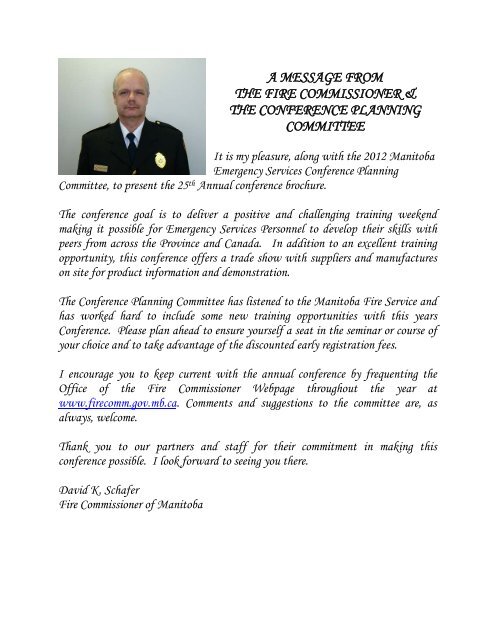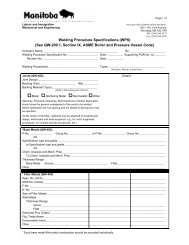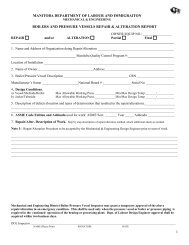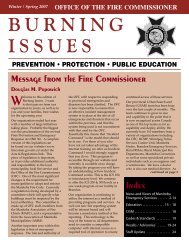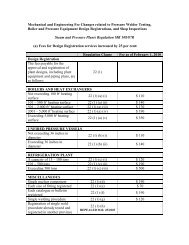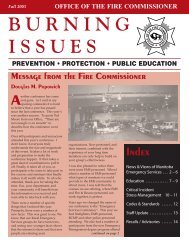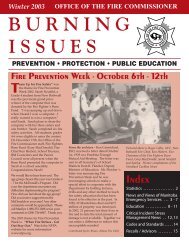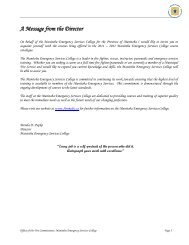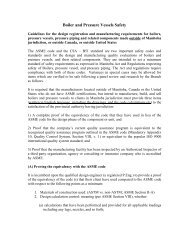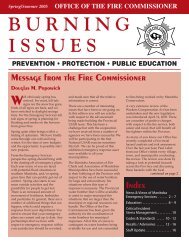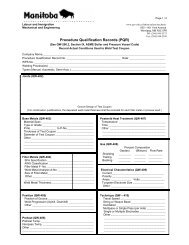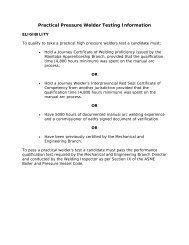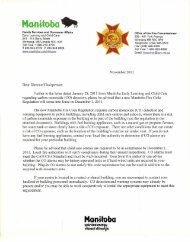a message from the fire commissioner & the conference planning ...
a message from the fire commissioner & the conference planning ...
a message from the fire commissioner & the conference planning ...
- No tags were found...
You also want an ePaper? Increase the reach of your titles
YUMPU automatically turns print PDFs into web optimized ePapers that Google loves.
A MESSAGE FROMTHE FIRE COMMISSIONER &THE CONFERENCE PLANNINGCOMMITTEEIt is my pleasure, along with <strong>the</strong> 2012 ManitobaEmergency Services Conference PlanningCommittee, to present <strong>the</strong> 25 th Annual <strong>conference</strong> brochure.The <strong>conference</strong> goal is to deliver a positive and challenging training weekendmaking it possible for Emergency Services Personnel to develop <strong>the</strong>ir skills withpeers <strong>from</strong> across <strong>the</strong> Province and Canada. In addition to an excellent trainingopportunity, this <strong>conference</strong> offers a trade show with suppliers and manufactureson site for product information and demonstration.The Conference Planning Committee has listened to <strong>the</strong> Manitoba Fire Service andhas worked hard to include some new training opportunities with this yearsConference. Please plan ahead to ensure yourself a seat in <strong>the</strong> seminar or course ofyour choice and to take advantage of <strong>the</strong> discounted early registration fees.I encourage you to keep current with <strong>the</strong> annual <strong>conference</strong> by frequenting <strong>the</strong>Office of <strong>the</strong> Fire Commissioner Webpage throughout <strong>the</strong> year atwww.<strong>fire</strong>comm.gov.mb.ca. Comments and suggestions to <strong>the</strong> committee are, asalways, welcome.Thank you to our partners and staff for <strong>the</strong>ir commitment in making this<strong>conference</strong> possible. I look forward to seeing you <strong>the</strong>re.David K. SchaferFire Commissioner of Manitoba
General InformationDEFINITIONS, POLICIES AND PROCEDURESAttendance: 100% attendance is required to successfully complete courses or seminars. Instructorshave <strong>the</strong> right to refuse any individual who does not comply with all <strong>conference</strong> requirements forattendance.Beards: The Manitoba Emergency Services adheres to Manitoba Regulation 217/2006 which refers toCSA Z94.4 sec 9.2.2.2 – persons using respirators shall be clean-shaven where <strong>the</strong> face piece seals to <strong>the</strong>skin. Anyone with a beard will not be allowed to participate in seminars using a Breathing Apparatus.Course/Seminar Cancellation: Courses or seminars with low registration will be cancelled onSeptember 21 st , 2012 and candidates will be moved to <strong>the</strong>ir next available choice.IFSAC: International Fire Service Accreditation CongressNFPA: National Fire Protection AssociationPersonal Protective Equipment (PPE): Must include coat, pants, balaclava, gloves, boots and helmet.This gear must be NFPA 1971, 2007 approved and in good condition. The Site Commander and/or SiteSafety Officers will make <strong>the</strong> determination if <strong>the</strong> condition of <strong>the</strong> PPE is questioned.Practical Training Site (PTS): Any seminars involving <strong>the</strong> PTS must adhere to <strong>the</strong> Policies for <strong>the</strong> site.Individuals who are not appropriately dressed will be asked to leave <strong>the</strong> PTS. The Burn Building adheresto <strong>the</strong> NFPA Standard 1403 “Live Fire Training Evolutions”. Anyone not adhering to this Standard will beasked to leave <strong>the</strong> PTS.SCBA: Self Contained Breathing Apparatus (must comply with CSA Z94.4-02).Safety Officers: Courses and seminars must adhere to <strong>the</strong> direction of <strong>the</strong> Safety Officers at all times.Seminars: The <strong>conference</strong> will be offering one and two-day seminars. These seminars will cover a widerange of emergency services skills and provide valuable information.Transcript Courses: These are Manitoba Emergency Services College courses. A transcript will beissued for courses with this symbol beside <strong>the</strong>m. Participants must complete all requirements and testingfor <strong>the</strong>se courses. Certificates will not be issued. (Please allow adequate processing time).Workers Compensation: Individuals registered on Emergency Services Conference courses must becovered by Workers Compensation with <strong>the</strong>ir respective emergency services department. The ManitobaEmergency Services College reserves <strong>the</strong> right to request proof of this coverage. Effective November2003 – Individuals not covered by Workers Compensation will not be allowed to register on any coursesor participate in any testing with <strong>the</strong> Manitoba Emergency Services College.
Conference Registration and FeesREAD CAREFULLYEnrolment into courses and seminars is limited to first-come-first-paid registration. Please registeron <strong>the</strong> application form found which will be posted at www.<strong>fire</strong>comm.gov.mb.ca prior to registrationopening on Aug 13, 2012. Read <strong>the</strong> registration information carefully, photocopies of <strong>the</strong> registrationforms are acceptable.Registration:Individuals attending must pay <strong>the</strong> full <strong>conference</strong> fee or <strong>the</strong> one day <strong>conference</strong> fee. Registrants paying<strong>the</strong> full <strong>conference</strong> fee will receive a ticket to <strong>the</strong> Friday night banquet. One day registrations mustpurchase banquet tickets separately. Anyone may attend <strong>the</strong> Trade Show for free. Last day to registerfor <strong>the</strong> <strong>conference</strong> is September 21 st , 2012. No fur<strong>the</strong>r registrations will be accepted after thatdate.**** No applications will be accepted prior to Aug 13, 2012. ****Fees:2 ½ Day Registration (Includes Banquet Ticket):Before September 7 th , 2012 fee is $285.00 + $14.25 (5% GST) = $299.25After September 7 th , 2012 fee is $350.00 + $17.50 (5% GST) = $367.501 Day Registration:Before September 7 th , 2012 fee is $175.00 + $ 8.75 (5% GST) = $183.75After September 7 th , 2012 fee is $225.00 + $11.25 (5% GST) = $236.25If you are faxing in your registration form, please note that all registration fees must be paid and proof ofpre-requisites received before individuals will be registered. All faxes are date and time stamped.Please allow for adequate administration time. Registrations will be processed and a fee assessedaccording to <strong>the</strong> date payment is received. The processing date is determined by <strong>the</strong> method of paymentdelivery:• By hand or fax – <strong>the</strong> official OFC “received date” stamp; or• By mail – <strong>the</strong> Canada Post postmark date on <strong>the</strong> envelopeMethods of Payment:• Cash• Purchase Order• Interac• Certified Cheque or Money Order (payable to Minister of Finance)• Master Card• VisaPlease use one application form for each registered participant. Ensure that you select at least three (3)choices. Conference registration staff will not choose courses or seminars for participants.Nametags are issued to every registered <strong>conference</strong> participant. This nametag is your passport around<strong>the</strong> <strong>conference</strong>. Please wear it at all times.
Cancellations, Processing Fees and Refunds: All cancellations and course changes must be submitted in writing before <strong>the</strong> registration deadline ofmidnight September 21 st , 2012. No refunds will be considered after this deadline. A $25.00 processing fee will be assessed to each individual course change. A 25% processing fee will be assessed to each <strong>conference</strong> cancellation.Note: Registration Forms will NOT be accepted if <strong>the</strong> form is completed in full.Friday Night Banquet & Keynote SpeakerFriday Banquet – Hosted by <strong>the</strong> Office of <strong>the</strong> Fire Commissioner, <strong>the</strong> Friday night banquet is included in<strong>the</strong> 2 ½ day <strong>conference</strong> registration fees. Tickets can be obtained at <strong>the</strong> Registration Desk by producingyour nametag. Additional Banquet tickets, at $35.00 per ticket may be (subject to availability) availablefor purchase at <strong>the</strong> Registration Desk.Keynote Speaker: Claude Beauchamp, M.A., M.P.A., certified FireOfficer II and Instructor II. Awarded <strong>the</strong>, NFPA/ IFSTA/ IAFC - 2012Fellowship for <strong>the</strong> Senior Executives in State & Local GovernmentProgram at <strong>the</strong> Harvard Kennedy School of Business.Please join us for a presentation by Claude Beauchamp, Director ofOperations at <strong>the</strong> Quebec National Fire Academy.With 12 years teaching at college-level and coordinating studentactivities Claude decided to join his hometown volunteer FireDepartment in 2000 in order to broaden his social implication in <strong>the</strong> long term. Here he found values thatare dear to him: trust, hard work, friendship, dedication and solidarity. Every <strong>fire</strong>fighter brought <strong>the</strong>ir ownskills to <strong>the</strong> group and for him it was experience in teaching and curriculum development. Training in <strong>the</strong>Fire Service became a true passion leading Claude to join <strong>the</strong> Quebec National Fire Academy in 2003 asan academic advisor. During his time with <strong>the</strong> academy Claude has written <strong>the</strong> FFI, FFII and Hazmatcurricula mandated for all <strong>fire</strong>fighters under <strong>the</strong> provincial regulation.In 2006, Claude was promoted to Director of Operations and since <strong>the</strong>n his dedication has been to <strong>the</strong>professionalization of <strong>the</strong> Fire Service. A major aspect of his work has been to provide quality trainingresources to all <strong>fire</strong>fighters. Claude has collaborated with IFSTA’s Initial Strategies and Tactics validationcommittee and is currently serving on <strong>the</strong> Essentials VI committee. Additionally Claude acts as anadvocate for <strong>the</strong> French-speaking <strong>fire</strong>fighters of North America, leading major translation projects(IFSTA’s manuals: Essentials V, Fire Investigator, Fire Instructor, etc.). In North America, Claude sits onIFSAC’s Council of Governors and Certificate Assembly Board of Governors, represents Quebec at <strong>the</strong>ProBoard and NAFTD, and is Vice-Chair of <strong>the</strong> Canadian Fire Service Education, Training and CertificationCouncil.Claude’s dedication to <strong>the</strong> professionalization of <strong>the</strong> Fire Service goes <strong>from</strong> <strong>the</strong> boots on <strong>the</strong> ground witha true believe that <strong>the</strong> Fire Service must answer John Granito’s call for a strong scholarship in <strong>the</strong> publicrealm. As such, he is student of <strong>the</strong> Fire Service engaged in doctoral studies in public administration.Claude hopes to contribute to <strong>the</strong> discussion about <strong>the</strong> Fire Service as a major institution in our societyand we look forward to hearing him at this year’s Manitoba Emergency Services Conference.
Conference HighlightsParking – The <strong>conference</strong> is NOT responsible for any parking violations. Participants parking at <strong>the</strong>MESC must request parking passes <strong>from</strong> seminar instructors and may only park in MESC assigned areas.Trade Show – View a wide range of leading edge equipment and technologies. Suppliers andManufacturers are on site for product information and demonstration. Display timings and locationsTBA.Shuttle Service – A daily shuttle service between <strong>conference</strong> venues is available to participants.Shuttles are stationed at <strong>the</strong> Victoria Inn starting at 12:00 noon Thursday and continuing to Saturday.This service is accessible until 6:00 pm each day.Lunch – Registered participants are allowed one plate per meal, which includes lunch Friday andSaturday. Participants must produce <strong>the</strong>ir nametag to receive a plate at <strong>the</strong> self-serve line. Turnoutgear is prohibited in areas where meals are served.Accommodation InformationBarney’s Motel Midway Motel Trails West Motor Inn105 Middleton Avenue 1860 – 1 st Street North 210 – 18 th Street North(204) 725-1540 (204) 725-1560 (204) 727-3800Toll Free 1-866-825-8166 Toll Free 1-888-523-9184 Toll Free 1-888-234-4040Canadian Inn North Hill Inn Western Motel150 – 5 th Street 1129 Braecrest Drive 1148 – 18 th Street(204) 727-6404 (204) 726-1818 (204) 728-5761Toll Free 1-800-852-2712 Toll Free 1-877-700-8989Casa Blanca Motor Lodge Redwood Motor Inn Lakeview Inns & Suites2728 Victoria Avenue 345 – 18 th Street North 1880 – 18 th Street(204) 728-1500 (204) 728-2200 (204) 728-1880Toll Free 1-888-293-9440 Toll Free 1-877-728-2200 Toll Free 1-877-355-3500Colonial Inn Victoria Inn Canad Inn1944 Queens Avenue 3550 Victoria Avenue 1125 – 18 th Street(204) 728-8532 (204) 725-1532 (204) 727-1422Toll Free 1-800-665-6373 Toll Free 1-800-852-2710Comfort Inn Royal Oak Inn & Suites Keystone Motor Inn925 Middleton Avenue 3130 Victoria Avenue 1050 – 18 th Street(204) 727-6232 (204) 728-5775 (204) 728-6620Toll Free 1-800-288-5150 Toll Free 1800-852-2709 Toll Free 1-877-728-3500Days Inn Super 8 Motel The Little Chalet2130 Currie Blvd 1570 Highland Avenue 1703 Middleton Avenue(204) 727-3600 (204) 729-8024 (204) 725-1574Toll Free 1-888-213-2192 Toll Free 1-800-800-8000 Toll Free 1-866-614-7685Hillcrest Motel Motel 6 Best Western1250 1 st Street North 815 Middleton Ave 205 Middleton Avenue(204) 725-1550 (204) 726-4000 (204) 727-7997
Conference ProgramPlease be advised, <strong>the</strong> Conference Program and ConferenceRegistration Forms will be posted at www.<strong>fire</strong>comm.gov.mb.caunder <strong>the</strong> <strong>conference</strong> link prior to Aug 13, 2012.
TWO and a HALF-DAY COURSESThursday, October 11 th , 1:00 pm – 5:00 pm,Friday, October 12 th , 8:30 am – 5:00 pm ANDSaturday, October 13 th , 8:30 am – 5:00 pmNOTE: Participants will NOT be enrolled in ANY course until payment isreceived AND proof of pre-requisites provided.Orientation to Live Burns (Minimum 12 - Maximum 20)Pre-requisites: Fire Fighting Level 1 & Emergency Services Instructor Level I.This course will prepare <strong>fire</strong> instructors to conduct live <strong>fire</strong> training. It focuses on <strong>the</strong> application of NFPA 1403 and will providecandidates <strong>the</strong> opportunity to conduct pre-<strong>fire</strong> documentation on an acquired structure. The second full day of <strong>the</strong> course will bespent conducting a live burn. Candidates must be prepared for a training day that exceeds <strong>the</strong> average training day timelines.Required Materials: Each participant must bring full approved Structural Firefighting PPE, including SCBA.Pump Operations Seminar (Minimum 8 - Maximum 12)This seminar is designed for <strong>fire</strong> service personnel to develop skills in <strong>the</strong> operation of <strong>fire</strong> pumpers. Participants will learn pressureregulating devices, <strong>the</strong> operating principles of drive lines, positive displacement and centrifugal <strong>fire</strong> pumps, foam systems, gaugesand controls, pumping <strong>from</strong> a hydrant, relay pumping, basic friction loss calculations to determine minimum pump pressure, pumptesting gauges controls and basic maintenance checks.Required Materials:- Each participant must bring paper, pencil and/or pen, calculator, highlighter, coveralls, safety boots, safety glasses andhardhat.- IFSTA text: Pumping Apparatus Driver/Operator Handbook, Latest Edition.Fire Service Hydraulics Seminar (Minimum 8 - Maximum 24)This seminar is designed for <strong>fire</strong> service personnel wishing to become proficient Driver/Operators of <strong>fire</strong> apparatus. Participants willlearn: basic calculations in friction loss, flow pressures, nozzle reaction, elevation, appliance loss, and wter distribution systems.Emphasis will be on <strong>the</strong> <strong>the</strong>oretical hydraulic applications. Participants will learn how to prepare quick reference material for aid on<strong>the</strong> <strong>fire</strong> ground. This course is taught using <strong>the</strong> METRIC system only.Required Materials:- Each participant must bring paper, pencil and/or pen, scientific calculator and highlighter.- IFSTA text: Pumping Apparatus Driver/Operator Handbook, Latest Edition.Introduction to Level II Fire Fighting Skills (Minimum 8 - Maximum 24)Pre-requisites: Fire Fighting Level 1 - PracticalThis course is designed to offer participants a chance to see and practice some of <strong>the</strong> skills that will be required to meet Manitoba’sLevel II practical requirements for testing. The participants will be introduced to Level II <strong>fire</strong>fighting skills including flammable liquid<strong>fire</strong>s, flammable gas <strong>fire</strong>s as well as o<strong>the</strong>r skills <strong>from</strong> <strong>the</strong> NFPA 1001 Level II course. Participants will work as a team on <strong>the</strong> <strong>fire</strong>ground to develop a proper approach as well as tactics to extinguish Class B <strong>fire</strong>s.Required Materials: Each participant must bring full approved Structural Firefighting PPE, including SCBA.Wildland Fire Fighting for Structural Fire Fighters (Minimum 6 – Maximum 12)Prerequisite: Incident Command 100 & Current Standard First Aid with CPR Level C (16 hours)This course is designed to provide members of municipal <strong>fire</strong> departments with <strong>the</strong> skills and knowledge to effectively conductwildland <strong>fire</strong>fighting operations. Objectives include communication, <strong>fire</strong>ground operations, wildland/urban interface, equipmentmaintenance, and mop-up operations.Required Materials:- Each participant must bring paper, pencil and/or pen, <strong>fire</strong>-retardant (Nomex) coveralls, CSA safety boots, safety glasses, workgloves and hardhat.- IFSTA Wildland Fire Fighting for Structural Firefighter, Latest Edition
Mobile Water Supply (Minimum 6 - Maximum 12)Pre-requisites: Hold a current Class 4 with Air Brake Endorsement is required with air brake equipped apparatus.(copy must be provided with registration)This course is designed for <strong>fire</strong> service personnel in <strong>the</strong> operation of water supply apparatus. Students will learn basic maintenancechecks, types of apparatus, water supply sources, water transit routes, fill and dump operations and portable take usage. Studentswill be issued a certificate upon successful completion of a written and practical exam. Full attendance is mandatory for completion.Required Materials:- Each participant must bring paper, pencil and/or pen, coveralls, safety boots, safety glasses, work gloves, and hard hat- IFSTA text: Pumping Apparatus Driver/Operator Handbook, Latest EditionRapid Intervention Crews (RIC) Seminar (formerly RIT) (Minimum 8 - Maximum 16)Pre-requisites: Fire Fighter Level 1- PracticalThis course is designed to provide <strong>fire</strong> fighters with <strong>the</strong> necessary skills to prepare and respond to <strong>the</strong> need for rapid intervention.The course covers <strong>the</strong> equipment required, <strong>the</strong> reasons why RIC should be part of every scene, and <strong>the</strong> practical skills required toperform rapid intervention. The practical skills will involve responding to rescue a downed <strong>fire</strong> fighter within a structure.Required Materials:- Each participant must attend with a SCBA and full approved PPE.- Delmar “Rapid Intervention Company Operations”, Mason and Pindelski, Latest EditionRescue Practices (Minimum 8 - Maximum 12)Pre-requisites: Incident Command 100 & Current Standard First Aid with CPR Level C (16 hours)This course is designed to prepare emergency services personnel with <strong>the</strong> skills to enter into o<strong>the</strong>r rescue specialties. Theparticipant will learn to operate under a recognized command structure, perform basic rope rescue skills (low angle environment),identify specific equipment and learn proper maintenance procedures.Pre-course reading and assignment must be completed prior to attendance. The pre-course assignment will besupplied via e-mail upon successful registration processing.Required Materials:- Rope Rescue Manual for Fire Rescue Services, (Latest Edition, Reliant Safety distributes this book. They can be reached at 1-877-582-0734 (toll free) or 1-204-582-0734 or www.reliantsafety.com- Each participant must bring gloves and appropriate clothing for working outside as wea<strong>the</strong>r may be inclement.Farm Accident Rescue Seminar (Minimum 6 - Maximum 12)Pre-requisites: Incident Command 100 & Current Standard First Aid with CPR Level C (16 hours) & VehicleExtrication SeminarThis seminar is designed to teach methods for responding to, and proper handling of various types of farm accidents. Variousmethods of disentanglement and patient packaging and removal will be demonstrated. This seminar is one-half <strong>the</strong>ory and one-halfpractical. The <strong>the</strong>ory is taught in a classroom setting using lecture, visual aid presentations and group discussion. The practical istaugh having <strong>the</strong> students perform rescues under simulated conditions using skills taught and equipment provided.Required Materials: Each participant must bring full approved PPE and safety glasses.Ground Search and Rescue - Basic (Minimum 8 - Maximum 24)Pre-requisites: Current Standard First Aid with CPR Level C (16 hours)This course provides individuals with <strong>the</strong> information and training necessary to become an effective member of team searching forlost individuals. Subject areas include personal requirements, navigation techniques and basic search operations.Required Materials: Each participant must bring footwear, clothing and optional daypack suitable to be outside for a full day onSaturday. Compasses and GPS units may be provided but bring your own if you have one.Wilderness Medic (Minimum 8 - Maximum 16)Learn how to treat injuries when you are hours or days away <strong>from</strong> a hospital and how to give care in extreme environments of cold,heat, or altitude. This seminar focuses on working with limited equipment and improvising. The seminar builds upon your skillsand teaches you how to adapt your knowledge and abilities to <strong>the</strong> demands of <strong>the</strong> wilderness. The goal is to equip emergency careproviders with <strong>the</strong> unique skills and knowledge to deliver care in wilderness settings.Required Materials: Each participant must bring coveralls, work gloves, safety boots, and a personal first aid kit.
Surface Water Rescue Seminar (Minimum 7 - Maximum 21)Pre-requisites: Incident Command 100 & Current Standard First Aid with CPR Level C (16 hours)This seminar is designed to teach <strong>the</strong> skills involved in various methods of performing surface water rescues, patient handlingtechniques and hazards to be aware of. It also describes how to set up a surface water rescue team. Practical is taught by havingparticipants perform rescues in surface water conditions using <strong>the</strong> methods taught.Required Materials: Each participant must bring appropriate clothing for working outside as wea<strong>the</strong>r may be inclement.Vehicle Extrication Seminar (Minimum 8 - Maximum 24)Pre-requisites: Incident Command 100 & Current Standard First Aid with CPR Level C (16 hours). Fire Fighter Level1 or Attestation <strong>from</strong> Fire Chief of completion of <strong>the</strong> following skills:• 5-1 Responding on Apparatus• 6-1 Donning PPE• 8-1 Operation Portable Fire ExtinguishersThis course is designed to teach <strong>the</strong> skills of how to approach and size-up a motor vehicle accident and <strong>the</strong> correct procedures forgetting into, stabilizing, & disentangling victims <strong>from</strong> vehicles. The procedures for packaging and removing victims are alsodemonstrated. Practical skills are taught by having <strong>the</strong> participants work on actual vehicles and perform <strong>the</strong> necessary skills.Required Materials: Each participant must bring full approved PPE and safety glasses.Fire Prevention & Public Education Seminar (Minimum 12 – Maximum 24)Introduction to FireSmart Community Planning (1.5hr)This session will provide insight and ideas into how to implement a FireSmart program within your communities or municipalities.Topics will include; why do we need Fire Smart? Values at risk for pre-<strong>planning</strong>; and FireSmart mitigation practices.Planning a Public Education Program/ Strategy (1.5hr)This session will provide an overview on how to develop and implement a public education program/ strategy in your community aswell as host a round table discussion on community prevention activities.Youth Fire Stop (2 Days)The Youth Fire Stop program is designed to provide <strong>fire</strong> service personnel, teachers, law enforcement, youth court officials, socialworkers, psychologists and metal health workers with information on assessment and effective management of juvenile <strong>fire</strong> setting.Participants will be given <strong>the</strong> latest information on assessment and effective management of youth <strong>fire</strong> setters. There will be anemphasis on broadening your knowledge base concerning children who set <strong>fire</strong>s. Participants will be exposed to specific, provenassessment tools and intervention strategies to deal with youth <strong>fire</strong> setting behaviour.
TWO-DAY COURSESFriday, October 12 th , 8:30 am – 5:00 pm ANDSaturday, October 13 th , 8:30 am – 5:00 pmPatient Packaging for Technical Rescue (Minimum 8 - Maximum 16)This course is designed for public safety personnel, EMS or Fire/Rescue, who may be required to assist in <strong>the</strong> care of a patient in atechnical rescue environment such as MVCs, confined space, or trench rescue. Course content includes; brief review of commoninjury patterns, patient packaging devices, spinal management, and extraction techniques. This is a primarily skills-based courseand participants should be prepared to spend <strong>the</strong> two days in a hands-on environment.Required Materials: Each participant must bring full approved PPE, coveralls, helmet, gloves, safety footwear andsafety glasses.K-9 Trauma First Aid Course (Minimum 6 - Maximum 12)This course is designed to prepare public safety personnel who work with, or in proximity to, working K-9 to provide basic lifesupport in <strong>the</strong> event of emergencies. Course content includes: Application and characteristics of working dogs, Rescuer safety –muzzling and restraining, K9 anatomy and physiology, <strong>the</strong> C-MARCHE approach to K9 first aid, and hands on training andapplication of skills including would management and splinting techniques. Applicants are encouraged to submit an application foran accompanying animal in <strong>the</strong> event that <strong>the</strong>y have an active or prospective working dog. Please complete an “Application forAccompanying K-9” (application available @ www.<strong>fire</strong>medic.ca - 2012 Conference link) as <strong>the</strong>re are a limited number of spots,priority for accompanying animal selection will be given to certified working dogs.Required Materials: Each participant must bring full approved PPE, coveralls, helmet, gloves, safety footwear andsafety glasses.Scene Investigation & Note Taking for Fire Fighters (Minimum 8 - Maximum 24)This seminar will give front line <strong>fire</strong> fighters an overall picture of <strong>the</strong> necessary elements of a <strong>fire</strong> investigation with emphasis onevidence identification, protection and note taking. Fire fighters can often find <strong>the</strong>mselves in <strong>the</strong> position of having to write a reporton <strong>the</strong> investigation. This seminar will cover <strong>the</strong> proper methods of note taking during an incident using an orderly and coherentmethod. Participants will be exposed to all <strong>the</strong> steps in a NFPA 1033 compliant <strong>fire</strong> cause investigation in a structure. This is ahands-on seminar and will include scene investigation, note taking on that investigation and a presentation to <strong>the</strong> group on <strong>the</strong>irnotes.Required Materials: Each participant must bring approved full turnout gear or heavy coveralls, work gloves, <strong>fire</strong> fighter boots orsafety boots, flashlight, helmet, acceptable digital camera and notebook with pen.Incident Command 200 (Minimum 8 - Maximum 24)Pre-requisites: Incident Command 100I-200 is designed to enable personnel to operate efficiently during an incident or event within <strong>the</strong> Incident Command System (ICS).This course focuses on <strong>the</strong> management of single resources. I-200 provides training for personnel who are likely to assume asupervisory position within <strong>the</strong> ICS. The course units and lessons provide introduction to leadership and management, delegation ofauthority and management by objectives, functional areas and positions, briefings, organizational flexibility, and transfer ofcommand. Exercises in <strong>the</strong> units are designed to demonstrate procedures. Reference material is provided to assist students in <strong>the</strong>classroom and on <strong>the</strong> job. The course is designed to be interactive in nature. It contains several exercises designed to facilitategroup and class discussion.Introduction to Safety Officer (Minimum 8 - Maximum 24)Fire fighter safety on <strong>the</strong> <strong>fire</strong> ground is <strong>the</strong> number one priority of <strong>the</strong> Incident Commander. On average, <strong>the</strong>re are 104 <strong>fire</strong> fighterfatalities annually in North America. How can we learn <strong>from</strong> <strong>the</strong> past and pre-plan our future to ensure sound judgement is beingused to mitigate incidents safely? This seminar will touch upon topics <strong>from</strong> <strong>the</strong> NFPA 1521 Fire Department Safety Officer(Incidents only) requirements, <strong>fire</strong> behaviour, building construction and types of collapse. There may be site tours.
Seminar for Fire Department Officers & Municipal Officials(Minimum 24 - Maximum 120)Managing and directing an effective department requires Officers and Municipalities to understand <strong>the</strong>ir responsibilities andauthority. This group of seminars will provide information and discussion to assist Fire Officers and Municipal Officials in <strong>the</strong>ir dayto day operations. Presentations will provide effective overviews of topics that affect legal, administrative and operational duties.Importance of Interagency Relations: The Fire Commissioner will provide a synopsis of current trends and issues as <strong>the</strong>yrelate to interagency relations. Included will be a discussion on regionalized training, coordinated response opportunities andservices <strong>the</strong> Office of <strong>the</strong> Fire Commissioner provides. Discussions will include existing interagency relationships and strategies forimproved or diversified relationships that will benefit professionalization of <strong>the</strong> Fire Service.Communicating With Elected Officials: This session will provide an informative look at <strong>the</strong> roles, responsibilities, negotiationtactics, presentation tools, and documentation related to effective communication with elected officials. As an additional bonusattendees will leave with tips, ideas, tools and resources that will assist <strong>the</strong>m when working toward <strong>the</strong>ir goals.Human Resource & Conflict Management: This informative session will provide attendee’s with strategic information oncurrent human resource management challenges as well as trends in human resource management in addition to some introductoryinformation on conditions which lead to conflict in <strong>the</strong> workplace, <strong>the</strong> effects of conflict and some strategies for managing conflict.What are <strong>the</strong>y saying about us? : This presentation is being given by Claude Beachamp, Director of Operations at <strong>the</strong> QuebecNational Fire Academy. Claude will present on <strong>the</strong> state of research on <strong>the</strong> Fire Service drawn <strong>from</strong> <strong>the</strong> North American scholarshipand target sensible issue in governance.Municipal Responsibilities for Fire Life Safety Inspections: This seminar will be an overview of <strong>the</strong> responsibilities formunicipalities to do <strong>fire</strong> and life safety inspections. The following topics will be highlighted; Why do <strong>fire</strong> life safety inspections,responsibilities, Acts and Regulations, what buildings need to be inspected, challenges of doing inspections, enforcement of <strong>the</strong>regulations, and <strong>the</strong> role of <strong>the</strong> Office of The Fire Commissioner and what <strong>the</strong> office is doing to support <strong>the</strong> municipalities.Workplace Safety & Health and <strong>the</strong> Fire Service: Knowing <strong>the</strong> risks, avoiding <strong>the</strong> pitfalls, and employing <strong>the</strong> best knowledgeand techniques ensure safety for everyone. Focusing on all aspects of WS&H, both on and off <strong>the</strong> <strong>fire</strong>ground, this seminar will givean overview of <strong>the</strong> Act and Regulations that are relevant to <strong>the</strong> emergency services. It will fur<strong>the</strong>r discuss common methods andbest practices to prevent close calls and injuries on <strong>the</strong> <strong>fire</strong>ground, and <strong>the</strong> role of <strong>the</strong> Incident Safety Officer at emergency scenes.Budget Planning at <strong>the</strong> Department Level: This seminar will introduce Fire Officers and Municipal Officials to basic FireDepartment Budget Planning including operational and capital expenses for effective <strong>fire</strong> departments at <strong>the</strong> municipal level.Technical Rescue Awareness, an All Hazards Approach: This seminar will be an overview of technical rescue awareness forFire Officers and Municipal Leaders. Included will be information on what types of technical rescue incidents may occur, legalitiesrelated to technical rescue responses and discussions surrounding proper <strong>planning</strong> and preparation for departments andmunicipalities who may be called upon to respond in a technical rescue environment.
ONE-DAY SEMINARSFriday, October 12 th 8:30 am – 5:00 pm ORSaturday, October 13 th 8:30 am – 5:00 pmEmergency Response to Natural Gas/LPG Odorant Spills (Maximum 24)(FRIDAY & SATURDAY)This one day presentation is directed to Emergency Responders (police, <strong>fire</strong>, ambulance) who may be called to respond to anincident involving <strong>the</strong> odorant (mercaptan) used in Natural and Liquid Petroleum Gas Systems. These could involve and MVCcarrying <strong>the</strong> odorant, spills during transfer <strong>from</strong> tanker to storage tanks or releases <strong>from</strong> storage tanks. The presentation co-taughtby Chevron/Phillips Chemicals and Manitoba Hydro will discuss <strong>the</strong> hazards and health concerns to responders and identify strategicand tactical response to a release or spill involving <strong>the</strong> odorant which may be transported through your community to <strong>the</strong> variousManitoba Hydro Gas Gate Stations where <strong>the</strong> odorant is injected into <strong>the</strong> gas lines. Attendees will also have <strong>the</strong> opportunity toengage in and/ or observe a hands-on drill.Radio Communications for <strong>the</strong> Emergency Services (Minimum 8 - Maximum 24)(FRIDAY & SATURDAY)Radio communications are an invaluable component of response operations. With proper radio usage directions, warnings andplans can be communicated. When radio communications are used improperly, operational disaster can result. Learn how modernradios, FleetNet and o<strong>the</strong>r communications systems work. Learn voice procedures, speech transmission techniques, emergencynotifications as well as logging communications.Life Safety Fire Inspections (Maximum 20) (SATURDAY ONLY)This hands-on seminar will give <strong>the</strong> participants some of <strong>the</strong> skills, check-lists and knowledge necessary to conduct inspections indaycares, schools and residential care facilities in your community. Let’s work toge<strong>the</strong>r to make sure <strong>the</strong>se important buildings areinspected properly and increase life safety within <strong>the</strong>se facilities for users and <strong>fire</strong> departments. A site inspection may be carriedout if a building is available.Emergency Vehicles and Roadside Hazards (Minimum 6 – Maximum 16) (FRIDAY& SATURDAY)Emergency workers such as police, <strong>fire</strong> and paramedic services providing emergency roadside assistance are at risk of being struckby vehicles travelling in nearby traffic lanes. To minimize <strong>the</strong> risk presented by working near moving traffic, emergency responseworkers need to know <strong>the</strong>se key things:‣ Safe work procedures must be in place regarding traffic control. Emergency response workers must be trained to follow<strong>the</strong>se procedures.‣ Emergency response workers must be provided with a means for protection.Learn how to develop and implement safe work procedures, what is required for worker protection, utilizing your apparatus toprotect <strong>the</strong> scene and PPE necessary to work near moving traffic.Incident Command 100 (Minimum 6 – Maximum 24) (FRIDAY ONLY)Introduction to Incident Command System, I-100 introduces <strong>the</strong> Incident Command System (ICS) ad provides <strong>the</strong> foundation forhigher level ICS training. This course describes <strong>the</strong> history, features and principles, and organizational structure of <strong>the</strong> IncidentCommand System. This course is designed to be interactive in nature. It contains several exercises designed to facilitate group andclass discussion.
Mass Casualty Incidents for Emergency Responders (Minimum 6 – Maximum 24)(SATURDAY ONLY)Motor vehicle collisions, structural collapses, hostile wea<strong>the</strong>r conditions, agricultural or industrial hazards, criminal activities – all arepotential mass casualty incidents that would require a multi agency response. How well prepared are you and your EmergencyResponse Services to deal with any of <strong>the</strong>se events? What is a MCI? What are <strong>the</strong> determinants to classify an event as an MCI?What happens when multiple agencies respond to an incident and how do <strong>the</strong>y co-ordinate <strong>the</strong>ir activities? This seminar will beginwith <strong>the</strong> definition of a MCI and <strong>the</strong> relevance of numbers. It will continue with a discussion regarding <strong>the</strong> importance of a properIncident Command System (ICS) as well as <strong>the</strong> importance of proper pre-<strong>planning</strong>, communication and co-ordination of resourcesand equipment between agencies. This will include triage, in particular, Simple Triage and Rapid Treatment (START), <strong>the</strong> use oftriage tags and tape, initial stabilization, and <strong>the</strong> care and transport of patients. Apparatus placement and traffic control areincorporated within <strong>the</strong> program. The importance of Critical Incident Stress Management (CISM) is also examined.Introduction to HAZMAT (Minimum 8 - Maximum 16) (FRIDAY ONLY)This course is for public safety professionals who may inadvertently find <strong>the</strong>mselves at a hazmat incident as part of <strong>the</strong>ir daily job.It focuses on recognizing a hazmat incident, including a review of transportation markings and clan labs among o<strong>the</strong>rs; and actionsupon identifying a hazmat incident in order to prevent injury and protect <strong>the</strong> public. It also includes a brief overview of <strong>the</strong> tieredlevels of hazmat response available within <strong>the</strong> province of Manitoba.HAZMAT Operations - Toolbox for Success (Minimum 8 - Maximum 16)(SATURDAY ONLY)This course is designed to facilitate success for Hazmat Ops students, or as a refresher for current HMO responders. Course topicsinclude: Recognition and Identification of Hazmat, Information Resources, Personal Protective Equipment, Protective Actions, andProduct Control.Pump Apparatus Maintenance & Checks (Maximum 6) (FRIDAY & SATURDAY)Our pumper trucks are critical to our ability to respond and fight <strong>fire</strong>s. Are you knowledgeable enough to maintain this vital piece ofequipment? As apparatus complexity grows, seasons change, and use increases; a properly maintained <strong>fire</strong> truck is important toyour department. Join this hands-on class in learning to maintain <strong>the</strong> systems, troubleshoot problems, and make basic repairs to<strong>the</strong> pump and its components.Required Materials: Coveralls, safety glasses, gloves, and safety boots


